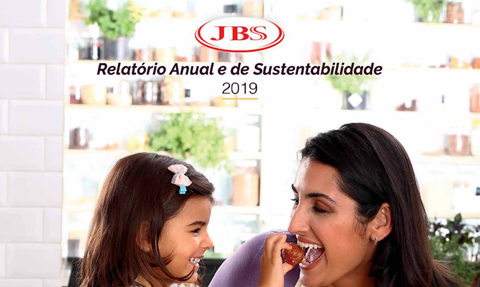JBS, the largest animal protein company and second-largest food company in the world has revealed that in 2019 it invested R$1.90 billion (USD$368m) on global sustainability-related initiatives.

The figure was revealed as part of its 2019 Annual and Sustainability Report which covers the company’s activities and performance for the period of January 1st to December 31st, 2019. The report also states that Sao Paulo-headquartered JBS’ record net revenue for the year exceeded R$200 billion (USD$38.7 bn).
The company said the major focus area was to invest in processes that encourage the sustainable production of raw materials (cattle, poultry, pork and lamb) in order minimise climate change risk and reach ambitious carbon emissions targets. Key achievements for the year included:
- JBS Brazil reused 121,000 metric tons of waste to generate energy, which is 9% more than the previous year.
- Over 1 million tons of waste generated by the company were also reused, accounting for approximately 50% of all waste generated.
- Over 3.3 billion litres of water were reused in company operations around the world. This amount of water is equal to 1,320 Olympic-size swimming pools.
- Globally, R$ 698.82 million (USD$135.5m) was invested in environmental stewardship at JBS factories.
A step towards the lowering of emissions in 2019 was the qualification of JBS Biodiesel as the first biodiesel company authorisation to take part in a new Brazilian policy to reduce greenhouse gas emissions. It is now authorised to issue Decarbonization Credits (CBio), as established by the RenovaBio programme. CBios are obtained from the production of biodiesel, the main raw material of which is bovine tallow. This will begin in 2020.
JBS has also invested towards solving to the sector’s structural problems. Traceability of the entire beef supply chain is an industry-wide challenge and a complex task. JBS has worked on the frontlines for over ten years to bring meaningful, responsible change in the Amazon region and has made a considerable investment in education, monitoring and enforcement to drive forward industry standards.
Producer partnership
In 2019, JBS Brasil brand Friboi entered into a partnership with the Araguaia League whose members include 60 livestock producers in the Médio Vale do Araguaia region, located in the state of Mato Grosso. The goal is to use sustainable livestock production to not only reduce greenhouse gases in the livestock chain but to contribute to environmental and biodiversity conservation.
Marcio Nappo, JBS’ director of sustainability said: “JBS is committed to investing in projects and solutions that can improve existing models used across the industry. Sustainability is a crucial part of our global business. As our Annual Sustainability Report 2019 shows, JBS’ business units have much to celebrate. We are also proud of the industry acknowledgements received and partnerships gained over the past year.
"As a sustainability leader in the field, we have worked to make sure that all 240,000 global employees of JBS are aware of and engaged in our sustainability initiatives. We also expect the same standards of our supply chain.
"In the face of the Covid-19 pandemic, 2020 has looked like a very different year with challenges of a different scale and new priorities brought to the forefront. We continue to make investments to reach our sustainability targets, protect our workforce and the environment, all of which are more important than ever in the evolving global landscape.”
This story was originally published on a previous version of the Meat Management website and so there may be some missing images and formatting issues.















